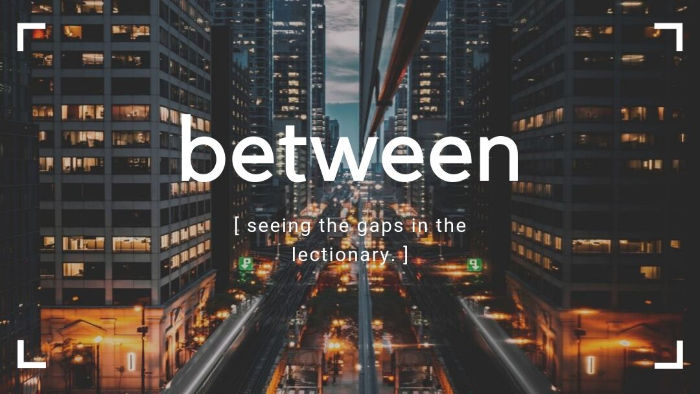
A look at the gaps in the lectionary.
This week: the gap between Proper 13A and 14A
The text: None
While there is no gap in the lectionary this week, many of us skipped last week’s propers in favor of the Transfiguration.
Last week saw a modest, but significant gap in the lectionary. This dealing with what undergirds Jesus’s teaching and the fallout for those who can’t see it. I encourage you to go back and read my (edited) take on that here.
What else we missed
The gospel for Proper 13A is the Feeding of the Multitudes. An abundantly familiar passage.
But since our bread and butter (or fish, in this case) in this series is to focus on the context, let’s give that a quick once-over before moving on to this week’s gospel (Matthew 14:22-33).
Jesus is tired.
This is consistent in each of the tellings of this story. Jesus is pushing, tries to go get some personal time, and the people are just there. They won’t let him have it.
I think there’s a reason we ignore this, of course. That damned Protestant Work Ethic. We love the idea of a leader working themselves to death. Nothing gets us going quite like the story of powering through and doing something amazing when others would quit.
This bias blinds us. Because it has us ignore hazardous conditions for the glory of grit. But usually, it just makes us all miserable.
Here’s an example.
Anthony Rizzo, the power-hitting first baseman for the New York Yankees, started 2023 off on a tear. The dude was raking in April, with loud home runs and an uncharacteristically high batting average. He was a stud. Then, from mid-May through August, he hit just one home run.
News came out in early August that he was diagnosed with post-concussion syndrome. Nobody knew. Which meant he wasn’t getting treatment. He was playing terribly. And his team suffered.
The “play hurt” mentality meant that everybody suffered.
There is no glory in this. Miracles are miracles for sure. But doing them when we’re exhausted isn’t something we ought to be glorifying. And it is a part of this story we treat as good rather than miraculous.
Jesus is sympathetic.
Like Jesus’s tiredness, I think we gloss over what this sympathy is about. And for much the same reason: our work bias.
Jesus’s sympathy for the people is not about a never-ending need that he, as the leader, powers through to do the hard thing. That narrative already does tremendous damage to leaders the world over.
There are specific places where we hear about Jesus’s sympathy. In places of injustice, sorrow, and ignorance. Where need is built around suffering and systemic oppression.
So this isn’t about general need, but a specific kind. Namely, that they are following him, are starving, and are still completely clueless. We should see Jesus’s response as reflecting the depth of their suffering.
This is especially poignant given the teaching in chapters 12 and 13 are the rabbi’s building blocks for deeper understanding.
And we must be clear on the difference that elicits Jesus’s compassion. Not that he lacks compassion for any person in need. But that, in the gospels, he specifically expresses compassion for those in particular need.
Jesus doesn’t feed this multitude because they are hungry. What he does is turn around and heal their sick. Then, when it is late and there are no other options, he has his disciples feed them.
You know what this actually sounds like? Jesus is treating them like he treats refugees. He has compassion for these exhausted and struggling people. He cures their loved ones who are sick. And he feeds them like neighbors.
Jesus is grieving.
He is seeking solitude because of the journey. And because of the news of the murder of John the Baptist.
This is a long journey. It isn’t getting any easier. And this moment, when we all want to focus on the miracle, is happening in the midst of one of Jesus’s most difficult experiences.
He will get some time after the feeding. When he and the disciples get away—Jesus up a mountain and the disciples by boat. He frees his friends and himself from working themselves to death.
This time is necessary. And may have to be enough.
